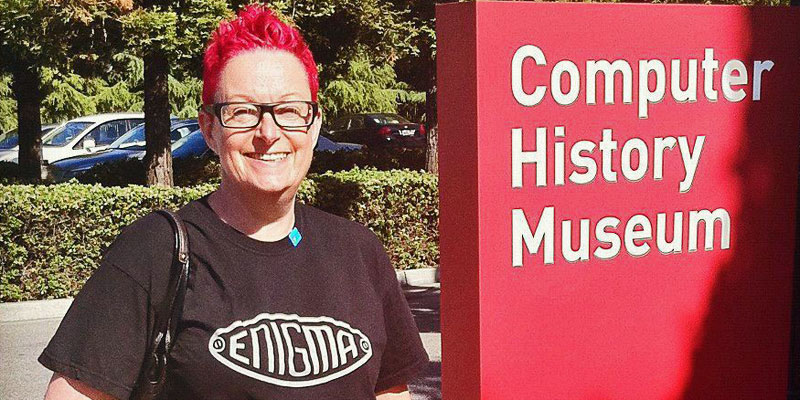Dr. Sue Black is a computer scientist who works as an honorary senior research associate at UCL, previously heading the Department of Information and Software Systems at the University of Westminster, London. Sue has been instrumental in championing the saving of Bletchley Park – the UK World War II centre for decrypting enemy messages – from destruction due to lack of funding. In 2015, Sue was identified as the 7th Most Influential Woman in UK IT by Computer Weekly and has won a string of awards including the first John Ivinson Award in 2009 from the British Computer Society, and in 2011, she won the PepsiCo Women’s Inspiration Award.
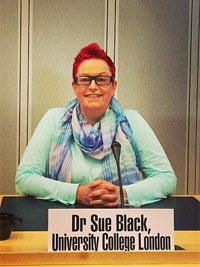
“…It’s good to know what coding is, what it does and to be able to do some simple things so you can just see how it works, but I don’t think everyone needs to be a programming whizz…”
From filing to a Ph.D. in Computing
I left school at 16 with five O-levels, as they were then. For my first job I worked for Essex County Council in the education department. I was doing filing, which wasn’t very exciting. I’d ended up having to leave school because my family situation had become not so great after my Mum died and my Dad remarried, and I wasn’t happy at home, so I left at 16. As I started my A-levels I was finding that I was working in the evenings to pay my rent, so I was going into school and falling asleep all the time.
So I decided to leave school and that’s how I ended up working at 16. My first job was filing, which was really boring and I thought to myself, “Well I could have done this job when I was four before I went to school, because I could read then. So what was the point of all this education?”
Moving to London
I got fed up with that and I wanted to do something different, so I ended up moving to London when I was 17 and working with refugees from Vietnam for a year, which included learning Vietnamese, which was really interesting.
Then I tried nursing, so I went to UCH [University College Hospital] and did the first year of nursing training, but I didn’t really like it, and then I thought to myself, “Well what subjects did I like at school?” And I liked maths, so maths led me to looking for accountancy jobs, so I worked in the accounts department of RCA Records for two years.
Escaping poverty through education
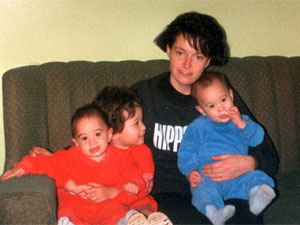
When I was 20 I got married and when I was 21 I had my first daughter, so then basically I had a career break. I had my twin sons when I was 23, so at 23 I had three children under three, and then unfortunately my marriage broke down so at the age of 25 so I was a single parent living on a council estate in Brixton bringing up my three kids.
So then I thought to myself, “Well I need to get a job which will give me more income than minimum wage,” because I would have been on something like minimum wage because I’d just started working, so with three kids I just thought, “I need to get an education.” So I did a maths course at night school at the college down the road and then I did a degree at South Bank University in Computing Studies.
Becoming a full time academic
That led me to doing a Ph.D. [Doctor of Philosophy] in Computing after that. So I did a Ph.D. and then I became a full time academic. Since then I’ve had a full time academic career until three of four years ago, which I really enjoyed.
So I went from South Bank University to the University of Westminster and spent the last four years as head of the Computer Science Department there, and then I took redundancy from that three or four years ago and started out on my own. I’ve got an Honorary position at UCL [University College London] now in their Computer Science Department, but my main focus now is on several things.
Amazing opportunities for people that have a basic understanding of a broad area of technology
I focus on running my charity called #techmums, which is all about helping mums to understand technology and realise the amazing opportunities that there are now for people that have a basic understanding of a broad area of technology. So that takes up quite a lot of my week. I’ve also just finished writing a book about the campaign I started in 2008 to save Bletchley Park. We’re just finishing that off and it should be out in October.
I also do quite a lot of public speaking now about my life and my careers, and the opportunities that are out there in technology. I also talk about Bletchley Park and about the campaign to save it, which involved social media to a great extent.
I also write for the Daily Mirror. I’m their technology agony aunt, so I write in response to technology questions that readers send in and I’ve also got a column in The Guardian too, where I write about technology, so most recently writing about women in technology, but I write about anything that interests me to do with technology.
Breaking down computer science to what it says on the tin
Computer science to me is the science of computers, to break it down to what it says on the tin. Computers are comprised if you boil it down to hardware and software. Hardware is the bit that you can pick and move around, and software is a list of instructions, which makes hardware do what you want it to do. At a very basic level you’ve got hardware and a piece of software running on it which is telling it what to do.
We write programmes and software (which are the same thing really). You might write a programme that’s say ten lines long to do something, but you can also write programmes that are millions of lines long.
Software is all around us in everything that we do
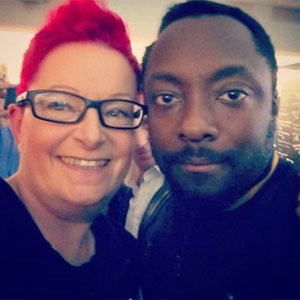
Almost everything around us now has got some software embedded in it, so if you think of our TVs, our cars, our washing machines, there’s some computing in there at some point. That’s becoming more and more prevalent. It’s all around us in everything that we do practically now, and of course we’re all now carrying round smartphones, so computer science is the basis of how our smartphones work, our laptops, but also its embedded in everything around us.
There’s also all of the wearable tech health equipment like Fitbit and Jawbone which are pretty small now and are able to pick up and maintain all of this information about us. It’s everywhere because it’s so small. As time goes on it’s getting more and more sophisticated, and smaller and smaller.
Using tech to make a difference
I met an amazing woman, Sammy Payne, when I was in Brazil earlier this month who has got a start-up called Open Bionics. She wanted to try to reduce the cost of prosthetic limbs, which I think currently Sammy was saying it’s about $100,000 for a prosthetic arm and they wanted to 3D print them, so that they could be mass produced and a lot cheaper. Apparently they can do it for $3,000. So people that aren’t able to afford $100,000 for a prosthetic limb will be able to buy it at a greatly reduced price.
So that’s an example of the way that technology is becoming very sophisticated and advancing very rapidly, and creative people are coming up with incredible ideas on how to use it in interesting ways. I love it when people are using technology to help other people, and to help make other people’s lives better. I absolutely love that.
Established power structures falling away
I also love what’s happening at the moment around the Sharing Economy, so stuff like airbnb and all kinds of organisations that are setting up. So airbnb is disrupting the hotel business and I love the way that it puts the users directly in touch with the suppliers. So all of those people who have built power structures through being middlemen in some kind of market, that’s all falling away now with the user and the supplier being put directly in contact. I think that’s great because it will reduce costs for the average person.
I also love stuff like Kiva that’s microlending, mainly to women in disadvantaged areas. I know that they’ve done lots in various countries in Africa, so microloans are being given to women to help them start businesses. They’ve got some amazing stories of women they’ve helped. They might only have lent them something like £30, but that sometimes in enough for someone to buy the start-up materials and tools for them to be able to get a business going, and once they’ve got that they can start earning money and can start paying back the loan.
Using social media to build empathy between groups of people
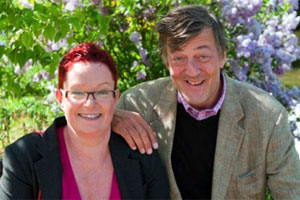
So I love that in the sense that it’s helping people with not much money to help themselves, but also in the way that it’s connecting people from countries that are thousands of miles from each other and their personal stories. I love the way that technology and social media are building empathy between groups of people that a decade or two ago would just never have had the opportunity to know about each other.
I love the way technology is making the world a better place.
Changing the public’s perception of science through outreach activities
Outreach activities are ridiculously important. The thing is, from the media through most of my life, most of the scientists that I’ve ever seen are male. If you say ‘scientist’ I think most people automatically even without trying to think of something, conjure up the image of an absent minded professor, Einstein kind of character.
Of course we’re not all thinking of that because that’s what it actually is, that’s because of how it’s been portrayed to us. So I think that outreach activities that show that’s not actually the case in a great percentage of science are really critical because we need to really show who’s out there and what people are doing.
Using Soapbox Science to talk in a different way
Taking part in Soapbox Science was great. I have to say I was absolutely petrified doing it in the first place because although I’m used to speaking in public, I’m not used to standing on a soapbox on the South Bank of the river talking about my research, so it was pretty scary! It’s talking about stuff in a different kind of way, because normally when you go and give a talk somebody else has sorted out the audience, so you don’t have to try and bring people in to come and listen to what you’re saying.
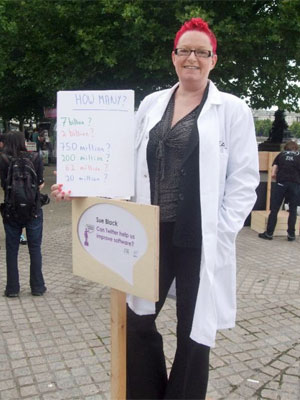
So it was a job to try and work out what was the best way to get people to come over and listen to what you’re saying, so of course you have to shout out quite radical statements to capture people’s interest!
Actually I really loved it. I can’t remember what the headlines I was shouting out were (!) but it was probably about the amount of people using social media and getting people involved in a conversation. I was talking about how many people are using social media and how that’s going to affect us all in the future. I think because I did it four years ago now it’s been quite interesting to see what’s happened with social media since then. At the time lots of people weren’t using it at all.
I don’t care what you had for breakfast… Social media is what you make it
A few years ago the common phrase was, if anyone mentioned Twitter, someone would always say, “Well I don’t care what you had for breakfast.” For some reason the media were then projecting the image that Twitter and social media was a waste of time and that it was just people talking about what they were eating or “I’m walking along the road.”
So it had that image for quite some time, so it’s great that people have now picked up on the fact that’s not actually what it’s all about and that social media is what you make it. The more you put into it, the more you get out of it.
So back to outreach, I think it’s critical for those activities to occur and I see now more women scientists are in the media and more diversity in the media, but I think that we’ve still got a long way to go before we don’t have to worry about it anymore.
Women in STEM building their presence in the media
I’ve been doing media for about six or seven years now and I think you just gradually get used to it. Like anything it’s a gradual process. First of all you’re scared stiff, then that just gradually, gradually goes away with experience and with finding that actually nothing goes terribly wrong!

I write in my book about the first time I was on live TV to talk about Bletchley Park and I was sat in TV Centre in Millbank. It was about ten minutes before I was going to go on the news at one, and I was just absolutely beside myself! I was so, so scared! I actually remember thinking to myself, “Please can I have a heart attack and die because I just can’t cope with the stress of what I’m going to have to do in a minute?!” I was so frightened.
It was funny because I saw Feargal Sharkey from The Undertones, who was sitting opposite me, and I saw that he looked really stressed as well, so I thought, “OK, it’s not just me. It’s also people who are famous already who get stressed as well!” And that calmed me down a bit and then it went fine.
It can be horrendously frightening to start with, but you do get used to it and I can’t think of a bad experience with anyone who’s interviewed me so far in several years of being on TV or being interviewed by journalists. So I think most of the time it’s absolutely fine. If you’re doing something very controversial that makes it more difficult. If you’re just talking about stuff that you know I think usually it’s fine. You just get used to it.
The importance of digital inclusion – helping everyone get a basic grasp of technology
The thing is, the world as we’re going forward into the future is becoming more and more a world of technology being part of everything that we do. So I was talking about washing machines and cars earlier, but technology is just all around us all the time now and if you’re applying for jobs, or for anything that you do you have to understand the online world to some extent and the world of technology. So I believe that the more and more that we as individuals can understand that, even to a basic level, then the better that is.
I think that what we really should be doing in the UK and across the world is helping everyone to get a basic grasp of technology. With the stuff that I’m doing with #techmums I started off wanting to try and get some sort of training in technology for everyone in the country, but realised after a few months that as one person (not being the Prime Minister of the Minister for Education!) it would prove very difficult for me to do that.
Technology is important and it can empower you to change your life for the better
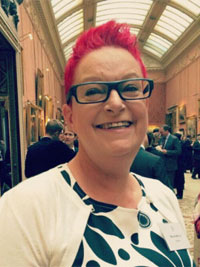
So I started trying to work out how to help people to understand that: a) That technology is important; and b) That it can empower them to change their lives for the better. So I came up with the idea of running a broad programme, which is what we’ve got now in the #techmums programme. So we do stuff around basic secretarial skills, I guess you could call it – so learning how to create documents and spreadsheets with Google Docs and stuff like that with email, but we also do stuff like app design and web design, social media, online security and a bit of coding.
The idea is not that we teach all of those areas in depth, but that we help people to get a basic understanding of what’s going on and help point them onto a path to continue having a look at whichever areas that they’re interested in.
Technology giving more jobs than it is taking away
So we need to get more girls and women into technology and coding because we need a more diverse workforce and we need to have women able to take up the opportunities that there are in technology now. Going back a while we thought that technology was a big threat of taking away jobs. In a way that’s right. Technology has and will take away some job, but it’s also creating lots of jobs and I believe that it’s creating more jobs than it’s taking away and also more interesting jobs than it’s taking away.
So if you think about social media, loads of people work in social media now, and that didn’t exist not very many years ago, and so there are lots of jobs, and there will be more jobs in areas like coding or the areas I’ve just mentioned like apps, web development, web design, all around security and even basic office skills.
Tech savvy women
We don’t want the people filling those jobs all to be guys because guys are excited about technology. We want everyone to be able to take up those opportunities and so with #techmums the whole idea is that we can help mums often haven’t been that confident around technology to be tech savvy and to be role models for girls and women in technology.
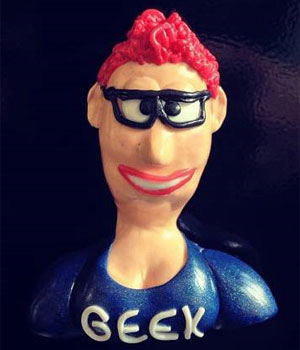
We also need diverse teams. If you end up with people who have a similar background and a similar way of thinking designing the products that we use in everyday life then we’re not getting the full range of ideas around what that product is or what it could do.
So thinking of the automated tills in supermarkets, I don’t know which team designed them, but I bet that there wasn’t a majority of women on that team and I bet it wasn’t a very diverse team because almost all of the ones that I’ve used are dreadful and they’re all over the place. They’re in every shop in the country but they’re a terribly bad design.
I think hopefully having a more diverse workforce in general will help us to have products that match our needs as a diverse population.
You don’t have to work the way you’ve always worked and you can manage your own career
I guess this is a new and emerging area, different types of jobs are coming up all the time and I think probably it’s quite hard for example for careers teachers to keep in touch with what’s actually happening in terms of what jobs are available. I think we really do need the ‘new’ careers in technology to be promoted out there to young people, but also to everyone.
I think the ways we work and our work life are different to what they might have been 20 years ago, but lots of people still don’t know that and appreciate what opportunities there are; that you can balance your work life, you don’t only have to work the way you’ve always worked. You can do some high value work for part of the week, then do other stuff which you really enjoy for free for part of the week, and in that way you can manage your own career.
All the jobs around the tech space
There’s so many jobs these days, not just in technology in a technical sense per se, but all around the jobs space. So if you think of say one app being designed and built, you’ve got designers, you’ve got technical people creating the code for the app, but you’ve also got all the services around where people need to be able to have an understanding of technology to be able to work. So this might be on marketing the app, promoting the app, the social media aspects of getting recognition for the app in the league tables, all of the communication that goes on all around what would happen and the launch of an app.
That’s just a really simple example but there are jobs around all of the technical jobs. It’s not just technical jobs and I think we need to get that message out there. We need lots and lots of people that understand the whole process and can work using their skills. Their skills don’t have to be that they’re great at coding. They can be that they love technology and they’re interested in helping.
There are more jobs around the more technical roles than there are the technical roles themselves, but I think most people think if they go into technology they have to have a technical role and that’s not true.
Not everyone needs to be a coding whizz
It’s good to know what coding is, what it does and to be able to do some simple things so you can just see how it works, but I don’t think everyone needs to be a programming whizz. It’s just good for everyone to know what it is, so I included coding in the #techmums course so that they see what it is, but I don’t think all out mums should be programmers. I think it de-mystifies it.
You hear people talking about hardware and software all the time, but it you don’t know what software is then it’s just a ‘thing’ – you can’t imagine it, but if you sit down and you learn how to write a five line programme which does something very basic, you’ve done that yourself and you understand what’s going on.
You’re told about the fact that software in just basically a list of instructions which are sent to the hardware in a computer, which tell it what to do and you’ve done that yourself, then suddenly it’s completely de-mystified when someone talks about ‘software’. You’ve got a good idea of what that is. Before you’d written that code you might not. That’s what the future looks like.
https://blackse.wordpress.com/
https://www.linkedin.com/in/sueblack
https://www.facebook.com/Dr-Sue-Black-158216156997/timeline/

